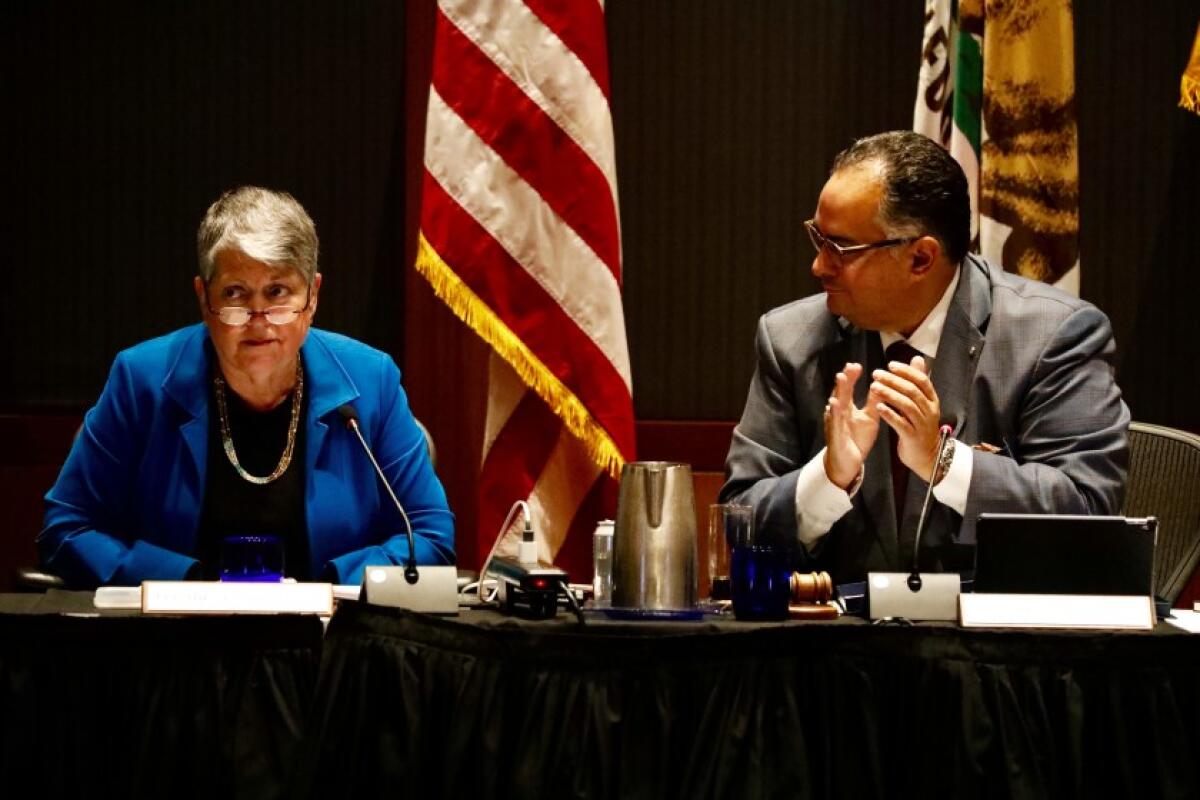After Supreme Court DACA decision, state universities commit support to immigrant students

- Share via
The University of California vowed Thursday to continue leading the way in supporting immigrant students, hours after the U.S. Supreme Court rejected the Trump administration’s plan to rescind temporary protections for young immigrants brought to the country illegally as children.
UC President Janet Napolitano and Board of Regents Chair John A. Pérez hailed the court decision in a case that the UC system first brought in 2017 and said the university would continue to provide its generous immigrant support services, including the nation’s first free legal services center for students without legal status.
“They still have special needs, particularly in the current environment, and we want to make sure that we are supporting them even as they pursue their university educations,” Napolitano said in a teleconference Thursday.
The 10-campus UC system enrolls an estimated 4,000 such students, but it is unknown how many of them qualified for the temporary protection from deportation and the right to a work permit under the program at issue, known as Deferred Action for Childhood Arrivals. Napolitano crafted that program in 2012 as Homeland Security secretary, benefiting immigrants who were bought to the United States illegally before age 16, attended school and stayed out of trouble. Those beneficiaries became known as “Dreamers.”
Pérez noted that California has long been in the forefront of immigrant rights — a cause he said he marched for as a 15-year-old student in the 1980s. Under a law known as AB 540, the state allows students without legal residency to pay in-state college tuition if they attended California schools, and the California Dream Act provides limited financial aid to immigrant students without legal status.
Such actions “expressed the desire of those of us in California to make sure that we expanded opportunity and worked towards broad-based immigration reform as well,” Pérez said. “And so I think it would be no surprise to anybody that this university is going to continue to commit itself to representing the interest of all our students,”
The UC leaders, along with California State University Chancellor Timothy P. White and California Community Colleges Chancellor Eloy Ortiz Oakley, vowed to fight for a permanent path to citizenship for the roughly 11 million immigrants in the United States without legal status.
The 23-campus Cal State system enrolls an estimated 9,800 students without legal status, and the 115-campus community college system has about 70,000, including about 20,000 to 35,000 with DACA protections.
“While this decision is an important victory, it does not protect the program from further challenge, nor does it provide a permanent solution to allow our Dreamers to achieve their aspirational goals,” White said in a statement. “The CSU continues to urge Congress to take swift, bipartisan legislative action toward a much-needed permanent solution so that our Dreamers can continue to fulfill their human potential and strengthen our campuses, communities, state and nation.”
Cal State Fullerton, which launched the Cal State system’s first resource center for students without legal status in 2014, had scheduled virtual listening and counseling sessions for Thursday in case the high court sided with Trump in rescinding DACA. Tonantzin Oseguera, Cal State Fullerton’s associate vice president of student affairs who lacked legal papers when she first emigrated from Mexico, said the sessions have been at capacity in recent weeks as anxieties about the impending court decision rose.
Many students were particularly nervous that the federal government has their addresses and other personal information required for the DACA application. “There’s been real concern that agents would use that information, drag you away and put you in a cage,” she said.
On Thursday, however, she was all smiles and said the sessions would now be celebrations. “Honestly, I was stunned” by the court decision, she said. “This is a huge and significant win for our Dreamers. They can continue to go to school and continue their livelihoods as productive citizens.”
Clara Medina Maya, a UC Merced graduate who just completed a yearlong fellowship at the University of Chicago, woke up Thursday to a string of text messages celebrating the high court’s decision. The first one came from a co-worker at 7:07 a.m.: “SUPREME COURT BLOCKS TRUMP FROM CANCELLING DACA PROGRAM.”
Medina Maya, who was brought to the Los Angeles area from Mexico at age 4, said the news means a life undisturbed — at least for now — working for an Illinois higher education advocacy group and then pursuit of a graduate degree in public policy.
“It felt like such a relief,” Medina Maya said. “Definitely this is the time to take it as a win for the community and use it to energize us to keep on fighting for more.”
More to Read
Sign up for Essential California
The most important California stories and recommendations in your inbox every morning.
You may occasionally receive promotional content from the Los Angeles Times.














